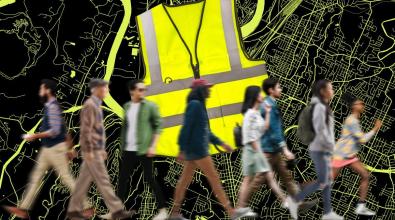 Read More
Read More
Strategies for spreading AI throughout local government

Listen to This Article
From Bogotá to Boise, cities’ applications of artificial intelligence grow more ambitious by the day. And that’s not only because the technology is advancing so quickly. It’s also because city leaders are staying in pace with that change—by taking steps to familiarize their whole organizations with the benefits of generative AI, to provide basic guidance and ground rules around its use, and to set up cross-cutting networks and collaboration to guide its citywide implementation. From using AI to improve core government functions visible to every city employee to embedding networks of experts across agencies to forming cross-sectoral partnerships, here’s how leaders are laying the groundwork for AI experiments to truly deliver.
Making the technology more familiar—and tangible—across city hall.
A growing number of local leaders are turning to AI to streamline one of their most essential yet complex tasks: procurement. This has the potential to not only enhance the impact of this critical process and save valuable staff time, but also help familiarize city employees with the practical benefits of AI in everyday operations.
Take Boston, which is currently developing a customized chatbot—trained on the city’s hundreds of pages of procurement procedures and rules—to accelerate purchases. To Chief Information Officer Santiago Garces, this work is primarily geared at producing greater efficiency for civil servants by reducing the time they spend seeking approval for purchases. “You want your firefighters not to be focused on buying gear, but on fighting fires,” Garces says.
But because almost everyone in City Hall engages with procurement and believes it to be cumbersome, AI-powered improvements can bolster the technology’s appeal. If civil servants from other agencies see that an AI-powered chatbot is getting them the equipment they need more quickly, it will amount to a powerful proof of concept.
“There's a few things that everybody does,” Garces says. “Everybody hires. Everybody buys.” And if cities change how procurement works with AI, they will show the whole of local government that it could be a game-changer for them, too.
Identifying leaders within agencies to disseminate best practices.
A year ago, experts at Bloomberg CityLab’s Mayors Innovation Studio advised that city leaders designate a point person to head up experimentation with artificial intelligence. Now, some local leaders are going further by identifying leaders within individual agencies who can help train their colleagues—and show them how AI can impact their specialized workflows.
In Boise, Idaho, for example, the city has rolled out an “AI ambassador” program that spreads knowledge about this work across departments by uplifting “ambassadors”—volunteers who conduct extra training—on their respective teams.
“AI is a technology for which top-down adoption just isn't going to be effective,” explains Kyle Patterson, the city’s chief innovation officer, calling instead for a bottom-up approach. To him, designating leaders who can work directly on AI applications with their subject-matter colleagues has been vital to making its use more common—and productive—in city hall.
According to Patterson, city employees’ estimated AI use has jumped by a factor of 10 since the rollout of the ambassador program. “When you have excited staff about something, that's your key to spreading it to other folks in the organization and having them be the evangelists in their departments,” he says.
Building out cross-sectoral partnerships to upskill staff.
As artificial intelligence applications multiply, cities are finding that building cross-sectoral partnerships can help them upskill their teams more quickly.
“What I see as the most successful strategy when it comes to implementing [AI] and getting some knowledge transfer is building strategic relationships,” says Melisa Breda, the former undersecretary of evidence-based public policies in Buenos Aires who now serves as senior data strategy and implementation advisor at the Bloomberg Center for Government Excellence at Johns Hopkins University.
In Buenos Aires, that meant forming a task force composed of tech company employees and city staff to ensure upskilling took place while the city built out its “Boti” chatbot service. And in Denver, it means holding events such as an AI summit later this month to foster meaningful partnership with the tech industry, rather than just purchase licenses of its AI products. At the summit, the focus won’t just be on the technology itself but on a specific challenge: using AI to make cities more affordable.
“We want to co-create solutions with these robust partner ecosystems,” explains Denver Chief Information Officer Suma Nallapati. Likewise, in Boston, the city’s AI experiments have leaned on academic institutions such as Northeastern University.
By tapping into local research centers, cities are not only identifying AI use cases, but also building their expertise to develop frameworks for assessing successful implementation. And the larger approach of sharing expertise across silos has city leaders everywhere feeling more confident in the potential for AI to make a difference for residents.
As Patterson, the Boise innovation officer—who also shares expertise with other cities on the Bloomberg Philanthropies global learning community and digital platform City AI Connect—puts it, this work represents “a great opportunity to network across the city.”

